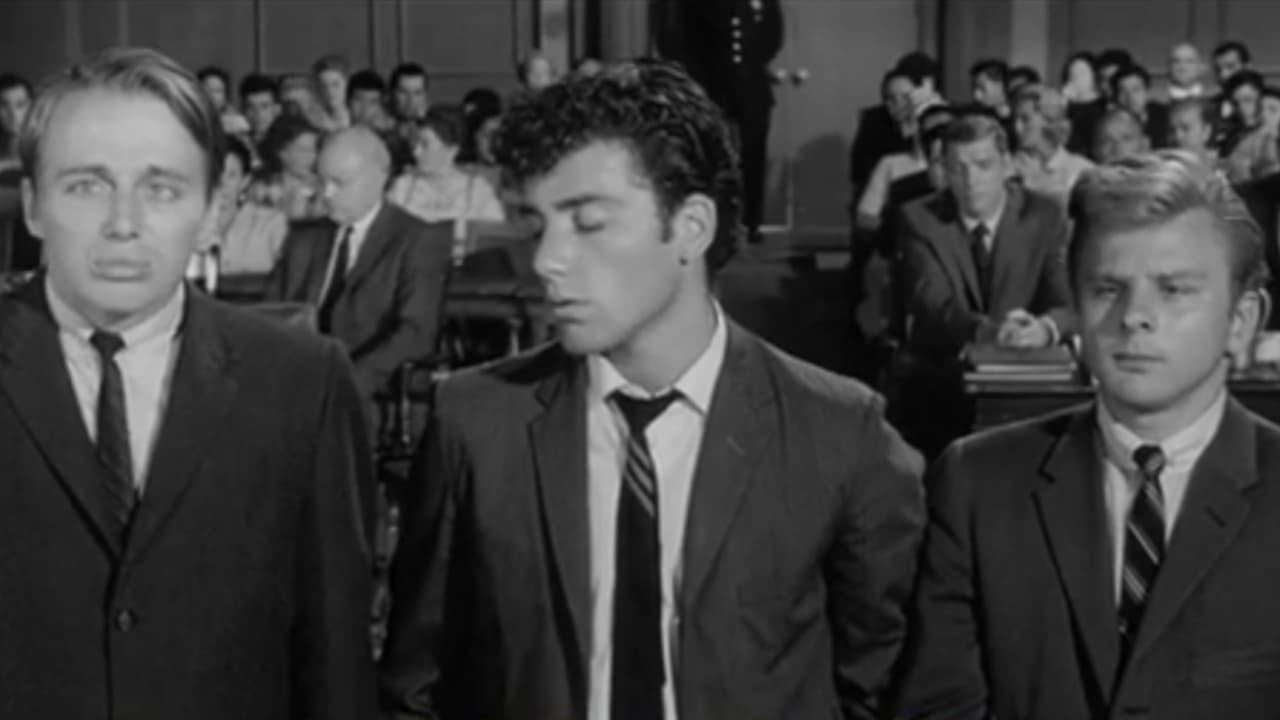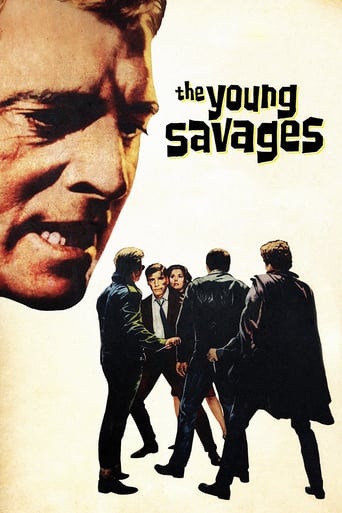

This movie was released the same year as West Side Story, At the beginning of this movie, one sees a gang of hoods swaggering down the street. One almost expects them to break out into song and dance like the Jets did in West Side Story. In fact, the beginning of this movie has MANY parallels to West Side Story—right down to the two NYC ethnic gangs fighting to protect their respective street turfs. One gang is Italian (but HERE they call themselves the Thunderbirds--rather than the Jets.) The other gang is Puerto Rican (but HERE they call themselves the Horseman—rather than the Sharks). These parallels are eerie and it almost seems like one movie is copying the other. However, at this point, the two movies diverge since The Young Savages is no musical, no modern retelling of 'Romeo and Juliet,' no love story. Furthermore, far from the self-satirizing done in 'Gee Officer Krupke,' The Young Savages DOES explore and probe factors such as the criminals' age, personal problems, ethnic background, and social surroundings to judge when and how 'crimes' should be judged and punished.The movie starts with the brutal gang killing of a blind Puerto Rican boy. The suspects are arrested as they flee the scene of the murder, but claim that the killing was done in self-defense. Hank Bell (Burt Lancaster) is the district attorney who prosecutes the case. His investigation takes him on a search that will teach as much about himself and HIS motives as it does with those of the suspects. First we learn that his wife, Karin (Diana Merrill), is a privileged WASP who is a critic of capital punishment; Hank is vengeful (which lead to tension with their marriage). As the prosecutor, Hank is basically working against the Italian gang (the suspects) and for the Puerto Ricans (the victims). BUT he, himself, is an Italian who had escaped (through education, marriage, and status) the same neighborhood where the suspects come from. In fact, he had formerly dated one of the suspect's mothers, Mary de Pace (Shelley Winters). The case that had looked like an open-and-shut capital murder, turn out to be more complicated than he had thought, as the fact about both side (suspects and victims) emerge.
... View MoreThe Young Savages (1961)Released six months before "West Side Story," this elegant story of New York gang violence in the ghettos of uptown Manhattan is as powerful, and as beautiful. And the title makes clear that the movie is pointing to a new social problem, the immigrant gangs (Italian and Puerto Rican in this case). But in most ways "The Young Savages" couldn't be more different. At the heart of it all is district attorney Hank Bell, previously Bellini, played by Burt Lancaster in what struck me as possibly the most subtle role in his career. That's an absurd thing to know for sure, and Lancaster is so good so often it's easier to just say he is terrific, but if you know him from some noir films or from "Birdman of Alcatraz" or "Judgement at Nuremberg" you might know a more overtly dramatic actor. Here he is restrained in a perfect way, his pauses and his turned head adding depth to his apparent struggle with how to get at the truth as the events and the witnesses start to swirl out of control. A virtuosic performance.The themes are hot topic issues layered with good old fashioned love and loyalty. Mostly we have first and second generation immigrant trying to define themselves, to stake out a place in the city, and to fend off competing immigrant groups and sometimes invade their territory. Bell's own Italian-American background makes him understand the problems of youth violence from the inside, but he has avoided being identified as Italian, and even his wife doesn't quite accept him as an immigrant, but wants to see him as more like her, a Vassar girl. Which he is not, even if sometimes he passes as a Yankee or as an old stock New Yorker.Much of the movie is that wonderful quite and deliberate investigation of the crime, the facts, the witnesses, the evidence. And we see this through Bell's eyes. The last long section is pure courtroom drama, and it's as good as courtroom dramas get, gutsy and tense. In the biggest sense, real justice is achieved, even at the expense of some reputations or expectations around the D.A. (who of course is supposed to always want and get the death penalty). By the final turns of events, you see the story is really about a single man who struggles against his own bias and does the right thing, and does it well. Director John Frankenheimer once again pulls off a movie with social significance that doesn't forget it's roots in theatrical drama.Cinematographer Lionel Lindon is an old pro, starting with some 1940s boilerplate movies sprinkled with some gems ("The Blue Dahlia" is a great one) and then scores of television shows. And the next year, 1962, he shot "The Manchurian Candidate" which succeeds partly for its amazing visual pizazz. Here, there are both moments of beauty and of cacophony. The fight scenes, and the dazzling murder that starts the movie off, are mini-masterpieces. But even quiet moments are given anxiety and drama by shooting at sharp angles or by moving in close. It's quite a beautiful experience to watch this, even as the events are tumultuous.
... View MoreBURT LANCASTER takes a lot of physical and verbal abuse from NYC street hoodlums in another gritty version of hero vs. punks from the author of THE BLACKBOARD JUNGLE. Blonde beauty DINA MERRILL is his wife whom he accuses of "graduating from Vassar with a degree in sarcasm". As the heroic D.A., Lancaster has the same uphill battle fighting for justice that Glenn Ford had as a schoolteacher in Evan's earlier work.But the problem is there are no new facets to the screenplay. It pretty much covers the same sort of material we've seen countless other times, with all of the incidents leading up to the courtroom climax being less than extraordinary. Some of the courtroom details are well done but overall the effect is more melodramatic than realistic.There are some serious flaws. The performances of the young toughs are often too exaggerated to emerge as truthful and undercut the realism. But Burt Lancaster anchors the story with one of his more restrained portrayals in a role that could easily have been overplayed.As persuasive as he is, he's working in a screenplay that is less than satisfying with regard to the scope and intent of the story. Unfortunately, the hoods come across too often as street tough caricatures and the courtroom conclusion is undercut by some hokey melodramatics.
... View MoreThis is one of those social conscience movies that were popular in the 50s and early 60s. This is not an especially good example of the genre. It follows prosecutor Burt Lancaster's investigation into a gang killing. The movie seems to be designed around a series of points the screenplay wants to make about the nature of slums and gangs and whether the death penalty is a good thing and that sort of thing, but it approaches all this in an unconvincing, mechanical manner. While the movie isn't all bad throughout, and seems vaguely interesting most of the way through, the trial at the end is so utterly absurd that it ruined what little momentum the movie had going. This is standard Hollywood law, in which Lancaster exhibits fairly incompetent prosecutorial behavior in his quest for "the truth." The movie is sincere and has good credentials, so it looks like it should be a good movie, but it really isn't.
... View More